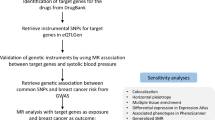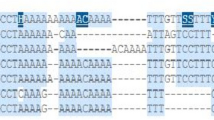Abstract
The association of the two ERCC polymorphisms, Asp312Asn and Lys751Gln, with lung cancer risk remains controversial and inconclusive. To better evaluate the potential role of the two polymorphisms and interaction with tobacco smoking in lung cancer susceptibility presented in diverse populations, we have conducted a meta-analysis based on 26 studies from 24 publications which included analyses of Asp312Asn (7121 cases, 8962 controls) and Lys751Gln (8396 cases, 10510 controls) polymorphisms. Overall, significantly elevated lung cancer risk was associated with ERCC2 312Asn allele(homozygous model: OR = 1.20[1.05–1.36], P = 0.006; recessive model: OR = 1.20[1.06–1.35], P = 0.004) and 751Gln allele(homozygous model: OR = 1.31[1.17–1.46], P < 0.00001; heterozygous model: OR = 1.11[1.04–1.19], P = 0.003; recessive model: OR = 1.23[1.11–1.37], P < 0.0001; dominant model: OR = 1.15[1.08–1.23], P < 0.0001). In ethnic subgroup analyses, significantly increased risk was associated with ERCC2 312Asn allele for both Caucasians and Asians, and 751Gln allele for both Caucasians and Latino-Americans. When stratified by smoking status, significantly elevated risk of both polymorphisms for never-smokers was detected (dominant model, OR = 1.46[1.09–1.95] and 1.57[1.19–2.08], P = 0.01 and 0.002, respectively). In conclusion, this meta-analysis suggests that the two ERCC2 polymorphisms may contribute to lung cancer susceptibility serving as low-penetrance risk factors. Extremely large-scale evidence would be necessary to confirm the effects on ethnically specific populations and gene-environment interactions.


Similar content being viewed by others
Abbreviations
- ERCC2:
-
Excision repair cross-complementing group 2
- XPD:
-
Xeroderma pigmentosum complementary group D
- HWE:
-
Hardy–Weinberg equilibrium
- OR:
-
Odds ratio
- CI:
-
Confidence Interval
- BPDE:
-
Benzo[a] pyrene dihydrodiol epoxide
References
Ferlay J, Shin HR, Bray F, Forman D, Mathers C, Parkin DM (2010) Estimates of worldwide burden of cancer in 2008: GOLOBCAN 2008. Int J Cancer (in press). doi:10.1002/ijc.25516
Jernal A, Siegel R, Ward E, Hao Y, Xu J, Thun MJ (2009) Cancer statistics, 2009. CA Cancer J Clin 59:225–249
Hecht SS (1999) Tobacco smoke carcinogens and lung cancer. J Natl Cancer Inst 91(14):1194–1210
Subramanian J, Govindan R (2007) Lung cancer in never smokers: a review. J Clin Oncol 25:561–570
Goode EL, Ulrich CM, Potter JD (2002) Polymorphisms in DNA repair genes and associations with cancer risk. Cancer Epidemiol Biomarkers Prev 11:1513–1530
Benhamou S, Sarasin A (2005) ERCC2/XPD gene polymorphisms and lung cancer: a HuGE review. Am J Epidemiol 161:1–14
Pabalan N, Francisco-Pabalan O, Sung L, Jarjanazi H, Ozcelik H (2010) Meta-analysis of two ERCC2(XPD) polymorphisms, Asp312Asn and Lys751Gln, in breast cancer. Breast Cancer Res. Treat (in press). doi:10.1007/s10549-010-0863-6
Berman NG, Parker RA (2002) Meta-analysis: neither quick nor easy. BMC Med Res Methodol 2:10
Higgins JP, Thompson SG, Deeks JJ, Altman DG (2003) Measuring inconsistency in meta-analyses. BMJ 327:557–560
DerSimonian R, Kacker R (2007) Random-effects model for meta-analysis of clinical trials: an update. Contemp Clin Trials 28:105–114
Egger M, Davey SG, Schneider M, Minder C (1977) Bias in meta-analysis detected by a simple, graphical test. BMJ 315:629–634
Begg CB, Mazumdar M (1994) Operating characteristics of a rank correlation test for publication bias. Biometrics 50:1088–1101
Rohlfs RV, Weir BS (2008) Distributions of Hardy–Weinberg equilibrium test statistics. Genetics 180:1609–1616
Spitz MR, Wu X, Wang Y et al (2001) Modulation of nucleotide excision repair capacity by XPD polymorphisms in lung cancer patients. Cancer Res 61:1354–1357
Butkiewicz D, Rusin M, Enewold L, Shields PG, Chorazy M, Harris CC (2001) Genetic polymorphisms in DNA repair genes and risk of lung cancer. Carcinogenesis 22:593–597
David-Beabes GL, Lunn RM, London SJ (2001) No association between the XPD (Lys751G1n) polymorphism or the XRCC3 (Thr241Met) polymorphism and lung cancer risk. Cancer Epidemiol Biomarkers Prev 10:911–912
Zhou W, Liu G, Miller DP et al (2002) Gene-environment interaction for the ERCC2 polymorphisms and cumulative cigarette smoking exposure in lung cancer. Cancer Res 62:1377–1381
Hou SM, Falt S, Angelini S et al (2002) The XPD variant alleles are associated with increased aromatic DNA adduct level and lung cancer risk. Carcinogenesis 23:599–603
Park JY, Lee SY, Jeon HS et al (2002) Lys751Gln polymorphism in the DNA repair gene XPD and risk of primary lung cancer. Lung Cancer 36:15–16
Chen S, Tang D, Xue K et al (2002) DNA repair gene XRCC1 and XPD polymorphisms and risk of lung cancer in a Chinese population. Carcinogenesis 23:1321–1325
Xing D, Tan W, Wei Q, Lin D (2002) Polymorphisms of the DNA repair gene XPD and risk of lung cancer in a Chinese population. Lung Cancer 38:123–129
Misra RR, Ratnasinghe D, Tangrea JA et al (2003) Polymorphisms in the DNA repair genes XPD, XRCC1, XRCC3, and APE/ref-1, and the risk of lung cancer among male smokers in Finland. Cancer Lett 191:171–178
Liang G, Xing D, Miao X et al (2003) Sequence variations in the DNA repair gene XPD and risk of lung cancer in a Chinese population. Int J Cancer 105:669–673
Vogel U, Laros I, Jacobsen NR et al (2004) Two regions in chromosome 19q13.2-3 are associated with risk of lung cancer. Mutat Res 546:65–74
Harms C, Salama SA, Sierra-Torres CH, Cajas-Salazar N, Au WW (2004) Polymorphisms in DNA repair genes, chromosome aberrations, and lung cancer. Environ Mol Mutagen 44:74–82
Popanda O, Schattenberg T, Phong CT et al (2004) Specific combinations of DNA repair gene variants and increased risk for non-small cell lung cancer. Carcinogenesis 25:2433–2441
Shen M, Berndt SI, Rothman N et al (2005) Polymorphisms in the DNA nucleotide excision repair genes and lung cancer risk in Xuan Wei, China. Int J Cancer 116:768–773
Zienolddiny S, Campa D, Lind H et al (2006) Polymorphisms of DNA repair genes and risk of non-small cell lung cancer. Carcinogenesis 27:560–567
Matullo G, Dunning AM, Guarrera S et al (2006) DNA repair polymorphisms and cancer risk in non-smokers in a cohort study. Carcinogenesis 27:997–1007
Hu Z, Xu L, Shao M et al (2006) Polymorphisms in the two helicases ERCC2/XPD and ERCC3/XPB of the transcription factor IIH complex and risk of lung cancer: a case-control analysis in a Chinese population. Cancer Epidemiol Biomarkers Prev 15:1336–1340
Yin J, Vogel U, Ma Y, Guo L, Wang H, Qi R (2006) Polymorphism of the DNA repair gene ERCC2 Lys751Gln and risk of lung cancer in a northeastern Chinese population. Cancer Genet Cytogenet 169:27–32
Ruyck KD, Szaumkessel M, Rudder ID et al (2007) Polymorphisms in base-excision repair and nucleotide-excision repair genes in relation to lung cancer risk. Mutat Res 631:101–110
Lopez-Cima MF, Gonzalez-Arriaga P, Garcia-Castro L et al (2007) Polymorphisms in XPC, XPD, XRCC1, and XRCC3 DNA repair genes and lung cancer risk in a population of northern Spain. BMC Cancer 7:162
Raaschou-Nielsen O, Sørensen M, Overvad K, Tjønneland A, Vogel U (2008) Polymorphisms in nucleotide excision repair genes, smoking and intake of fruit and vegetables in relation to lung cancer. Lung cancer 59:171–179
Sreeja L, Syamala VS, Syamala V et al (2008) Prognostic importance of DNA repair gene polymorphisms of XRCC1 Arg399Gln and XPD Lys751Gln in lung cancer patients from India. J Cancer Res Clin Oncol 34:645–652
Chang JS, Wrensch MR, Hansen HM et al (2008) Nucleotide excision repair genes and risk of lung cancer among San Francisco Bay Area Latinos and African Americans. Int J Cancer 123:2095–2104
Yin Z, Su M, Li X et al (2009) ERCC2, ERCC1 polymorphisms and haplotypes, cooking oil fume and lung adenocarcinoma risk in Chinese non-smoking females. J Exp Clin Cancer Res 28:153
Manuguerra M, Saletta F, Karagas MR et al (2006) XRCC3 and XPD/ERCC2 single nucleotide polymorphisms and the risk of cancer: a HuGE review. Am J Epidemiol 164:297–302
Kiyohara C, Yoshimasu K (2007) Genetic polymorphisms in the nucleotide excision repair pathway and lung cancer risk: a meta-analysis. Int J Med Sci 4:59–71
Wang F, Chang D, Hu FL et al (2008) DNA repair gene XPD polymorphisms and cancer risk: a meta-analysis based on 56 case-control studies. Cancer Epidemiol Biomarkers Prev 17:507–517
Vineis P, Manuguerra M, Kavvoura F et al (2009) A field synopsis on low-penetrance variants in DNA repair genes and cancer susceptibility. J Natl Cancer Inst 101:24–36
Zhang J, Qiu LX, Leaw SJ, Hu XC, Chang JH (2010) The association between XPD Asp312Asn polymorphism and lung cancer risk: a meta-analysis including 16,949 subjects. Med Oncol (in press). doi:10.1007/s12032-010-9501-8
Camps C, Sirera R, Iranzo V, Tarón M, Rosell R (2007) Gene expression and polymorphisms of DNA repair enzymes: cancer susceptibility and response to chemotherapy. Clin Lung Cancer 8:369–375
Wolfe KJ, Wickliffe JK, Hill CE, Paolini M, Ammenheuser MM, Abdel-Rahman SZ (2007) Single nucleotide polymorphisms of the DNA repair gene XPD/ERCC2 alter mRNA expression. Pharmacogenet Genomics 17:897–905
Lunn RM, Helzlsouer KJ, Parshad R et al (2000) XPD polymorphisms: effects on DNA repair proficiency. Carcinogenesis 21:551–555
Qiao Y, Spitz MR, Shen H et al (2002) Modulation of repair of ultraviolet damage in the host-cell reactivation assay by polymorphic XPC and XPD/ERCC2 genotypes. Carcinogenesis 23:295–299
Au WW, Salama SA, Sierra-Torres CH (2003) Functional characterization of polymorphisms in DNA repair genes using cytogenetic challenge assays. Environ Health Perspect 111:1843–1850
Matullo G, Peluso M, Polidoro S et al (2003) Combination of DNA repair single nucleotide polymorphisms and increased levels of DNA adducts in a population-based study. Cancer Epidemiol Biomarkers Prev 12:674–677
Zhan P, Wang Q, Wei SZ et al (2010) ERCC2/XPD Lys751Gln, Asp312Asn gene polymorphism, lung cancer risk: a meta-analysis involving 22 case-control studies. J Thorac Oncol 5(9):1337–1345
Laine JP, Mocquet V, Bonfanti M, Braun C, Egly JM, Brousset P (2007) Common XPD (ERCC2) polymorphisms have no measurable effect on nucleotide excision repair and basal transcription. DNA Repair (Amst) 6:1264–1270
Zhao H, Wang LE, Li D, Chamberlain RM, Sturgis EM, Wei Q (2008) Genotypes and haplotypes of ERCC1 and ERCC2/XPD genes predict levels of benzo[a] pyrene diol epoxide-induced DNA adducts in cultured primary lymphocytes from healthy individuals: a genotype-phenotype correlation analysis. Carcinogenesis 29:1560–1566
Yin J, Vogel U, Ma Y, Qi R, Sun Z, Wang H (2007) A haplotype encompassing the variant allele of DNA repair gene polymorphism ERCC2/XPD Lys751Gln but not the variant allele of Asp312Asn is associated with risk of lung cancer in a northeastern Chinese population. Cancer Genet Cytogenet 175:47–51
Li Y, Shen CC, Ye Y et al (2010) Genetic variants and risk of lung cancer in never smokers: a genome-wide association study. Lancet Oncol 11:321–330
Landi MT, Chatterjee N, Yu K et al (2009) A genonme-wide association study of lung cancer indentifies a region of chromosome 5p15 associated with risk for adenocarcinoma. Am J Hum Genet 85:679–691
Acknowledgements
We are indebted to Dr. Kim De Ruyck and Dr. Ole Raaschou-Nielsen for paper availability. We are grateful to Panpan Hao and Yong Zhang for expert assistant. This study was supported by the National High-Tech Research and Development Program of China (Program 863) (2007AA021802), and the Natural Science Foundation of Shandong Province of China (ZR2010HM067).
Conflicts of interest statement
None declared.
Author information
Authors and Affiliations
Corresponding author
Additional information
Zhen Feng and Yang Ni contributed equally to this work.
Rights and permissions
About this article
Cite this article
Feng, Z., Ni, Y., Dong, W. et al. Association of ERCC2/XPD polymorphisms and interaction with tobacco smoking in lung cancer susceptibility: a systemic review and meta-analysis. Mol Biol Rep 39, 57–69 (2012). https://doi.org/10.1007/s11033-011-0710-9
Received:
Accepted:
Published:
Issue Date:
DOI: https://doi.org/10.1007/s11033-011-0710-9




